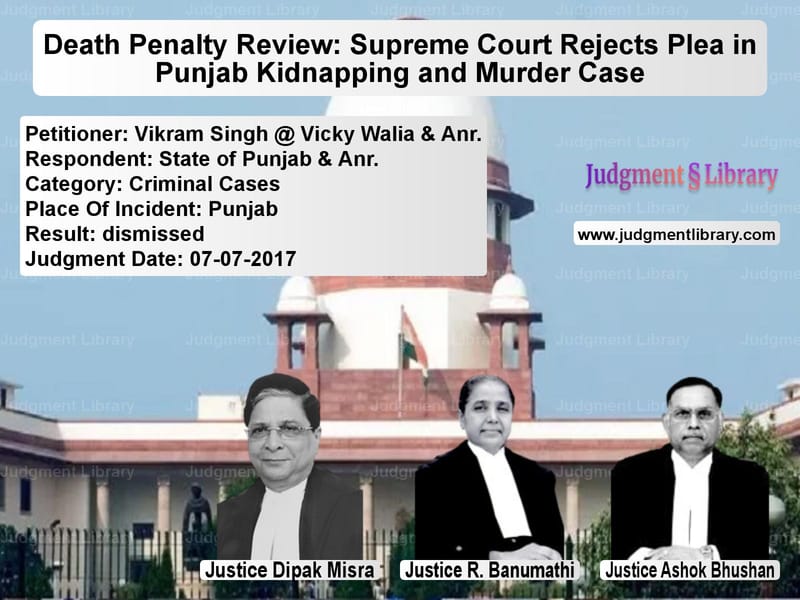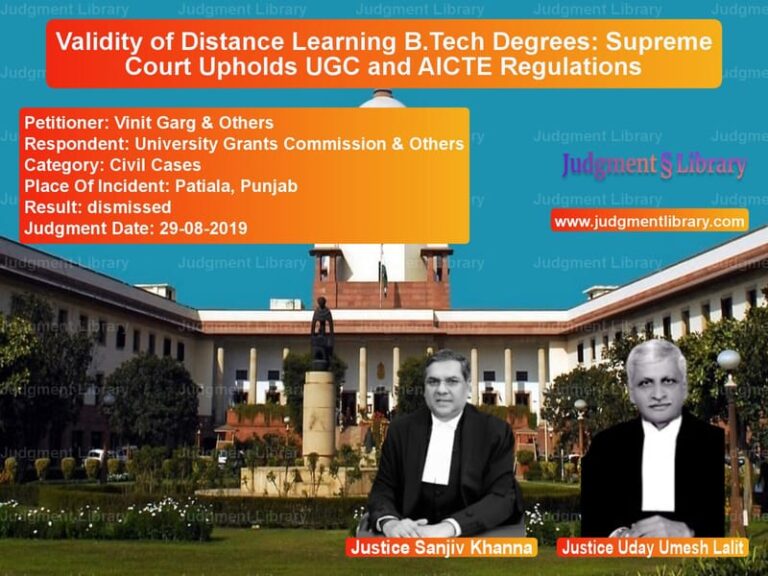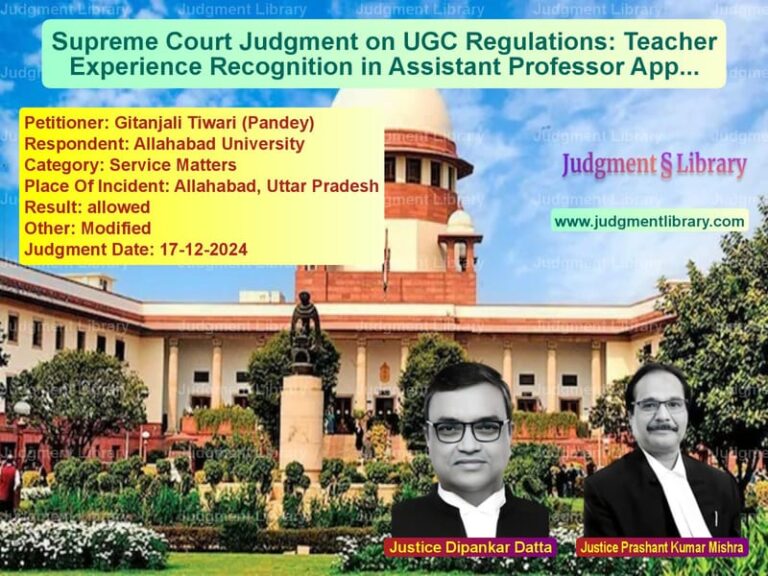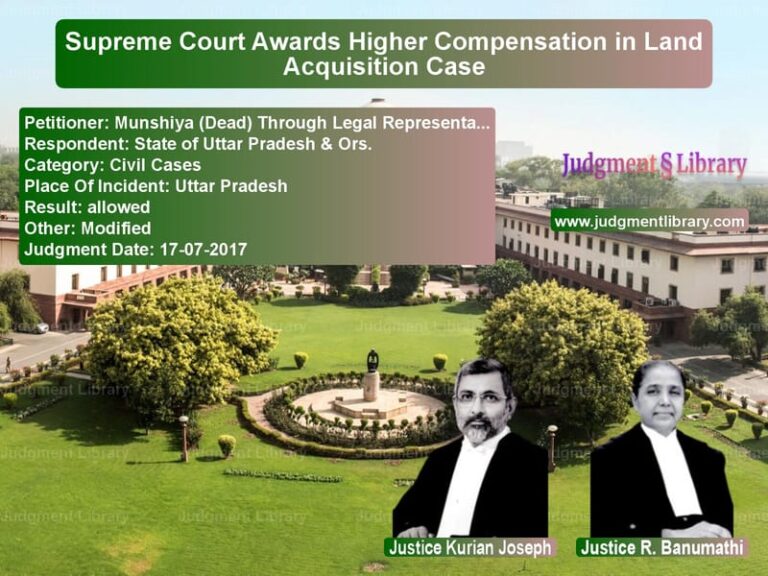Death Penalty Review: Supreme Court Rejects Plea in Punjab Kidnapping and Murder Case
The Supreme Court’s judgment in Vikram Singh @ Vicky Walia & Anr. vs. State of Punjab & Anr., delivered on July 7, 2017, reaffirmed the death penalty for two individuals convicted of a brutal kidnapping and murder case. The ruling rejected the review petitions filed by the convicts and upheld the capital punishment imposed on them, emphasizing the seriousness of the crime and the lack of mitigating factors.
The case revolved around the kidnapping and murder of a young boy for ransom. The trial court, Punjab and Haryana High Court, and the Supreme Court had all previously confirmed the death sentence. The review petition sought reconsideration in light of the Supreme Court’s decision in Mohd. Arif alias Ashfaq vs. Registrar, Supreme Court of India & Others, which allowed oral submissions in death penalty review cases.
Background of the Case
The appellants, Vikram Singh @ Vicky Walia and Jasvir Singh @ Jassa, along with a third accused, Smt. Sonia, were convicted for kidnapping and murdering a 16-year-old boy. The prosecution presented strong evidence, including ransom calls and forensic findings.
Key developments in the case:
- 2005: The victim was kidnapped and later murdered.
- 2007: Trial court sentenced the accused to death under Sections 302 and 364A IPC.
- 2008: Punjab and Haryana High Court confirmed the death sentence.
- 2010: Supreme Court dismissed the appeal and upheld the death penalty.
- 2011: Review petition was dismissed.
- 2016: Fresh review petitions filed after the Supreme Court’s ruling in Mohd. Arif case.
- 2017: Supreme Court rejected the review petitions and upheld the death sentence.
Arguments by the Petitioners (Vikram Singh & Jasvir Singh)
The petitioners contended:
- The previous decision did not consider all mitigating factors.
- The trial court relied on a tape-recorded conversation without a valid certificate under Section 65B of the Evidence Act.
- The death sentence was disproportionate given the circumstances of the case.
- New legal precedents on death penalty jurisprudence warranted reconsideration.
Arguments by the Respondents (State of Punjab)
The prosecution countered:
- The evidence, including ransom calls and forensic findings, clearly established guilt.
- The brutality of the crime justified the death sentence.
- The case fell under the “rarest of the rare” category as defined in Bachan Singh vs. State of Punjab.
- The plea regarding electronic evidence was meritless since the recording was an original and not secondary evidence requiring a Section 65B certificate.
Supreme Court’s Observations
The Supreme Court, comprising Justices Dipak Misra, R. Banumathi, and Ashok Bhushan, made the following key observations:
“The tape-recorded conversation was original evidence and did not require a Section 65B certificate.”
“There is no apparent error on the face of the record in recording conviction of the applicants under Sections 302 and 364A IPC.”
“The trial court and High Court rightly categorized this case as one of the ‘rarest of the rare’ deserving the death penalty.”
Supreme Court’s Judgment
The Supreme Court ruled:
- The review petitions were dismissed.
- The death sentence remained unchanged.
- The evidence was properly considered in the original judgment.
- The principles of review jurisdiction did not allow for rehearing on already settled issues.
Key Takeaways
- Death Penalty Review Limited in Scope: The ruling confirms that review petitions in capital punishment cases must meet strict legal criteria.
- Electronic Evidence Rules Clarified: Original recordings do not require a Section 65B certificate under the Evidence Act.
- Rarest of the Rare Doctrine Reinforced: The judgment upholds established principles for awarding the death penalty.
- Judicial Finality in Criminal Cases: The Supreme Court emphasized that review jurisdiction cannot be used as an appeal in disguise.
Impact of the Judgment
The ruling has significant implications for criminal law:
- Strengthens the finality of capital punishment decisions.
- Clarifies the admissibility of electronic evidence in criminal trials.
- Ensures that review petitions are not misused to delay justice.
- Upholds the principle that the death penalty is reserved for the most heinous crimes.
Conclusion
The Supreme Court’s decision in Vikram Singh @ Vicky Walia & Anr. vs. State of Punjab & Anr. underscores the strict criteria for reviewing death penalty cases. By dismissing the review petitions and reaffirming the death sentence, the ruling reinforces the principles of judicial finality and proportionality in capital punishment cases. This judgment serves as a significant precedent for future death penalty reviews in India.
Don’t miss out on the full details! Download the complete judgment in PDF format below and gain valuable insights instantly!
Download Judgment: Vikram Singh @ Vicky vs State of Punjab & An Supreme Court of India Judgment Dated 07-07-2017.pdf
Direct Downlaod Judgment: Direct downlaod this Judgment
See all petitions in Murder Cases
See all petitions in Bail and Anticipatory Bail
See all petitions in Fraud and Forgery
See all petitions in Judgment by Dipak Misra
See all petitions in Judgment by R. Banumathi
See all petitions in Judgment by Ashok Bhushan
See all petitions in dismissed
See all petitions in supreme court of India judgments July 2017
See all petitions in 2017 judgments
See all posts in Criminal Cases Category
See all allowed petitions in Criminal Cases Category
See all Dismissed petitions in Criminal Cases Category
See all partially allowed petitions in Criminal Cases Category







